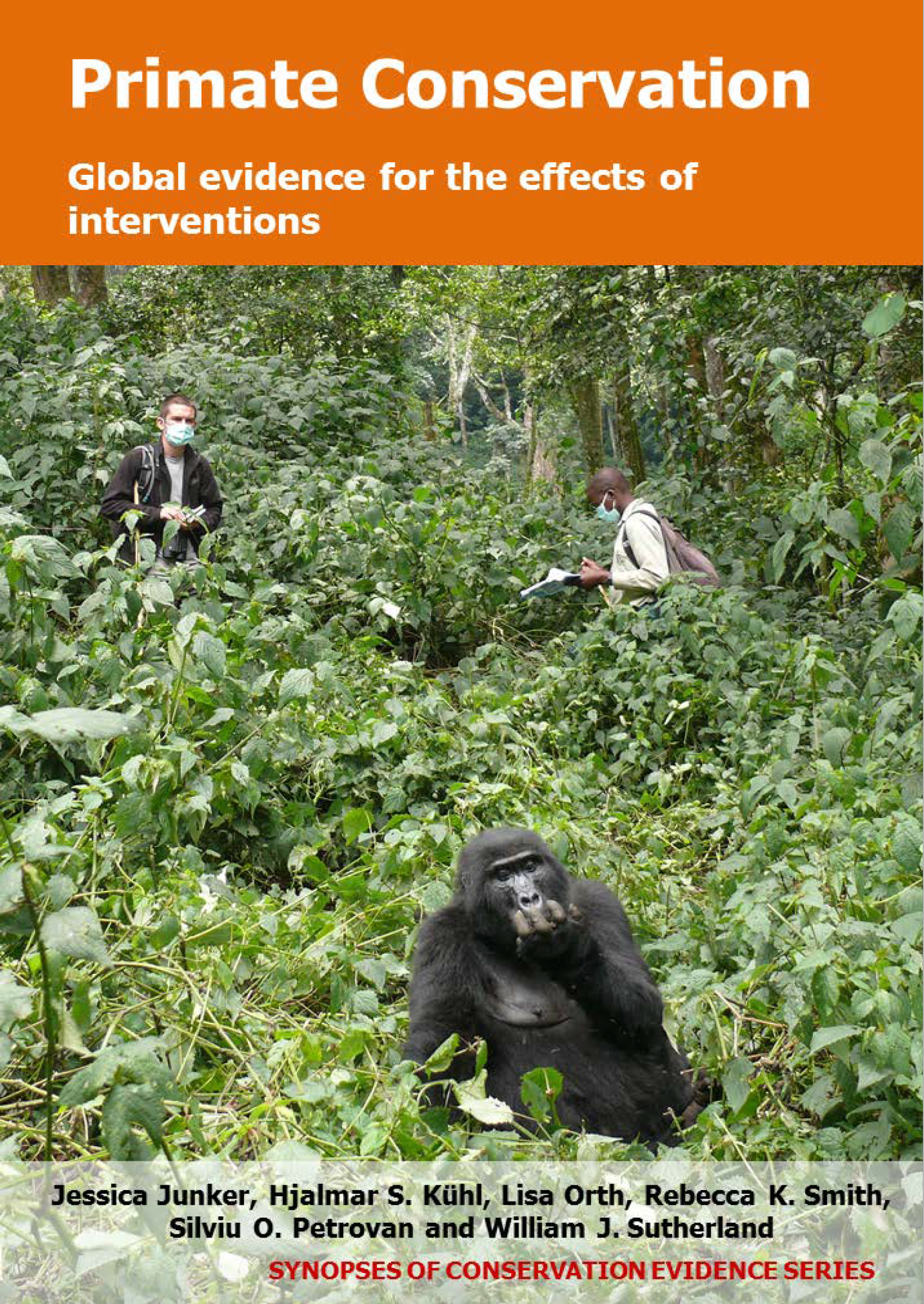Actions to conserve biodiversity
We have summarised evidence from the scientific literature about the effects of actions to conserve wildlife and ecosystems.
Review the evidence from the studies
Not sure what Actions are? Read a brief description.
Search for evidence
e.g. "frogs chytrid"
162 Actions found
Refine
Hide
162 Actions found
Download Actions
| 0 selected |
|
Order results by:
| Action | Effectiveness | Studies | Category | |
|---|---|---|---|---|
|
Use nets to keep primates out of fruit trees Action Link |
Unknown effectiveness (limited evidence) | 1 |
|
|
|
Strengthen/support/re-install traditions/taboos that forbid the killing of primates Action Link |
Unknown effectiveness (limited evidence) | 1 |
|
|
|
Implement monitoring surveillance strategies (e.g. SMART) or use monitoring data to improve effectiveness of wildlife law enforcement patrols Action Link |
Unknown effectiveness (limited evidence) | 1 |
|
|
|
Avoid/minimize logging of important food tree species for primates Action Link |
Unknown effectiveness (limited evidence) | 1 |
|
|
|
Implement a ‘no-feeding of wild primates’ policy Action Link |
Unknown effectiveness (limited evidence) | 1 |
|
|
|
Put up signs to warn people about not feeding primates Action Link |
Unknown effectiveness (limited evidence) | 1 |
|
|
|
Guard habituated primate groups to ensure their safety/well-being Action Link |
Likely to be beneficial | 1 |
|
|
|
Regularly disinfect clothes, boots etc. Action Link |
Unknown effectiveness (limited evidence) | 1 |
|
|
|
Implement continuous health monitoring with permanent vet on site Action Link |
Unknown effectiveness (limited evidence) | 1 |
|
|
|
Translocate (capture & release) wild primates from abundant population areas to non-inhabited environments Action Link |
Unknown effectiveness (limited evidence) | 1 |
|
|
|
Educate local communities about primates and sustainable use Action Link |
Unknown effectiveness (limited evidence) | 1 |
|
|
|
Regularly play TV & radio announcements to raise primate conservation awareness Action Link |
Unknown effectiveness (limited evidence) | 1 |
|
|
|
Create/protect habitat corridors Action Link |
Likely to be beneficial | 1 |
|
|
|
Create/protect forest patches in highly fragmented landscapes Action Link |
Unknown effectiveness (limited evidence) | 1 |
|
|
|
Plant indigenous trees to re-establish natural tree communities in clear-cut areas Action Link |
Unknown effectiveness (limited evidence) | 1 |
|
|
|
Reintroduce primates into habitat without predators Action Link |
Unknown effectiveness (limited evidence) | 1 |
|
|
|
Relocate primates to non-residential areas Action Link |
No evidence found (no assessment) | 0 |
|
|
|
Discourage the planting of fruit trees and vegetable gardens on the urban edge Action Link |
No evidence found (no assessment) | 0 |
|
|
|
Create natural habitat islands within agricultural land Action Link |
No evidence found (no assessment) | 0 |
|
|
|
Use fences as biological corridors for primates Action Link |
No evidence found (no assessment) | 0 |
|
|
|
Provide sacrificial rows of crops on outer side of fields Action Link |
No evidence found (no assessment) | 0 |
|
|
|
Compensate farmers for produce loss caused by primates Action Link |
No evidence found (no assessment) | 0 |
|
|
|
Pay farmers to cover the costs of non-harmful strategies to deter primates Action Link |
No evidence found (no assessment) | 0 |
|
|
|
Retain nesting trees/shelter for primates within agricultural fields Action Link |
No evidence found (no assessment) | 0 |
|
|
|
Plant nesting trees/shelter for primates within agricultural fields Action Link |
No evidence found (no assessment) | 0 |
|
Download Actions
| 0 selected |
|

Primate Conservation - Published 2017
Primate Synopsis
Watch this search
If you are familiar with RSS feeds, please click the button below to retrieve the feed URL:
RSS feed for this searchIf you are unfamiliar with RSS feeds, we would suggest reading this BBC article.
Unfortunately, due to the number of feeds we have available, we cannot provide e-mail updates. However, you could use tools such as Feed My Inbox to do this for you.
What are 'Individual studies' and 'Actions'?
Individual studies
An individual study is a summary of a specific scientific study, usually taken from a scientific journal, but also from other resources such as reports. It tells you the background context, the action(s) taken and their consequences.
If you want more detail please look at the original reference.
Actions
Each action page focuses on a particular action you could take to benefit wildlife or ecosystems.
It contains brief (150-200 word) descriptions of relevant studies (context, action(s) taken and their consequences) and one or more key messages.
Key messages show the extent and main conclusions of the available evidence. Using links within key messages, you can look at the paragraphs describing each study to get more detail. Each paragraph allows you to assess the quality of the evidence and how relevant it is to your situation.
Where we found no evidence, we have been unable to assess whether or not an intervention is effective or has any harmful impacts.





)_2023.JPG)














